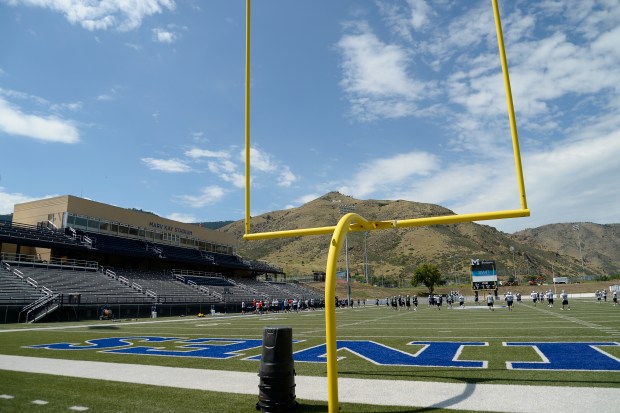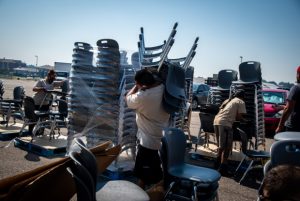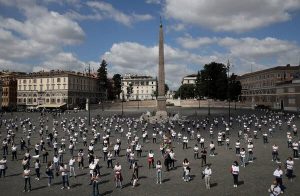BOULDER — Dave Logan was lost for words. How ironic is that? Voice of the Broncos for a quarter century now, radio host, coach, leader, pitch man extraordinaire, an hombre who wears more 10-gallon football hats than almost anybody along the Front Range, scrambling to pick his jaw up off the floor.
No high school football in Colorado? No college football, either? Sacrilege. It’s like somebody shot Rudolph and hung that reindeer head, red nose and all, up on the cabin wall.
“What I try to remind myself is what I told my kids the day that I (found out) we weren’t going to be allowed to go forward this fall,” Logan, the Cherry Creek High School football coach, former CU Buffs standout and longtime Broncos play-by-play man, says with a wounded chuckle.
“(I told them), ‘It feels like somebody walked up and handed you a bag of doo-doo. So we have one of two things we can do. We can walk around and say, I’m carrying a bag of (expletive). Or we can go put it under a tree and use it as fertilizer and try to make the best of a lousy situation.’
“It’s a hokey analogy, but it was the only thing I could think of to tell my team.”
Welcome to Colorado. Welcome to Autumn 2020, the fall we were all left holding the bag.
“Now the state’s on fire,” says Kevin Levad, part-owner of Lucky Joe’s Sidewalk Saloon in Fort Collins, an iconic CSU Rams watering hole. “It’s non-stop. It’s one thing after another. The most brutal year I’ve ever experienced.”
It’s about to get more brutal. Cripes, we can hear them already, can’t we? The sounds. Our sounds. Our heartbeats, our souls, whispering back at us, almost mockingly, from across the borders to the north, the east and the west.
The bands in Nebraska. The crunches in Wyoming. The cheers in Utah. The soundtrack to Colorado in the fall, played out in the distance. While we socially distance.
Until COVID-19, CU had trotted a football team out every autumn since 1890. CSU fielded a team every year from 1899-1942 and consecutively since 1945. The first sanctioned championship season under what later became CHSAA, then called the Colorado High School Athletic Conference, began in 1921.
What’s a football state to do when there’s almost no football? When the most dominant sound on Friday nights and Saturday afternoons is stony, surreal silence?
“For a lot of people, it means a heck of a lot,” says Logan, who’s won eight state prep titles as a coach at four schools and is heading into his 24th year as the radio play-by-play voice of the Broncos. “For a lot of people, it’s a part of your life. It’s intertwined into the fabric of who you are. And so there’s an emotional component of this that I think has been difficult to balance.
“We’ve had differing opinions. We’ve had differing opinions medically speaking. It has been almost impossible to decipher through a lot of this, what it really is and what it’s not. And that is a really difficult thing for grown-ups. You can imagine how tough it is on 16-to-21-year-old kids.”
“He doesn’t get to redeem himself”
And burros. Kat Tomon is going to miss the holy heck out of her pal Blaster this fall, and she’s pretty sure the feeling’s mutual. Especially after his final run around Marv Kay Stadium at Campbell Field last November finished off with a harbinger of what was to come in 2020.
“He ended up pooping on the football field,” laughs Tomon, a senior and, as president of Colorado Mines’ Blue Key Society, one of Blaster’s handlers. “He had gone the entire season without pooping. He would go right before or right after. For some reason, the very last touchdown of the season, he poops on the field.
“And everyone’s running out trying to get it and I’m just there holding Blaster and he’s pulling me away from the scene of the crime to his favorite strip of grass. He was just avoiding people. It was almost like he was embarrassed.”
Denver Post file
Orediggers are practicing in their new stadium on Aug. 16, 2015.
Which is weird. Ordinarily, he’s a social dude, at least as oversized miniature burros go. Blaster is going on his third decade of scooting around the field after a Mines touchdown. Which also means he’s gotten a lot of work over the first five seasons of The Gregg Brandon Era.
“It’s almost like he’s feeding on the energy around him,” Tomon says. “(He thinks), ’I’m a celebrity, everyone loves me, I’m going to show everyone why they love me.’
“He’s super-friendly, also. He never takes off. Never kicks. Never bites. He’s like a dog, but bigger. He’s awesome.”
He’s kind of isolated, too, what with the Rocky Mountain Athletic Conference pushing football, men’s soccer, women’s soccer and volleyball to the spring. The grazing life on the ranch in Idaho Springs is groovy and all. It ain’t show business.
“He doesn’t get to redeem himself this year,” Tomon says. “So I think he might be a little bit sad about that.”
“Saturdays are going to be different.”
Levad feels his pain. He’s the son of a football coach. He’s also worked the sidelines at CSU for about 20 years, acting as head of the ball crew for the last eight. He used to be a cord guy, keeping the coaches’ lines from tangling the way the leashes of playful puppies sometimes do during a brisk walk.
“I was raised on the sidelines,” he says. “Not being able to go to that stadium, that’s going to be one of the biggest things, to me.
“The second biggest is getting back to (Lucky Joe’s) after the game and all the old students and all the old regulars. The economic impact — it’ll pass. But not seeing those connections you gain over 25 years, the Kevin McDougals that come around, the California guys that come around when they come back for a game or two.”
COVID-19 forced the saloon closed the day before St. Patrick’s Day, axing their biggest business day of the year. No. 2? Homecoming. And thanks to the Mountain West, now that puppy’s off the calendar, too. A Rocky Mountain Showdown date with CU, originally slated for Sept. 5, would’ve felt like New Year’s Eve all over again.
“There’s a lot of smaller bars that haven’t been around as long as us that may not be there (in 2021),” Levad says. “That’s sad.”
He jokes that he’ll be spending more weekends than usual in the mountains over the next few months, at least before the snow starts up again. Levad’s even going to the rerun well, talking to the Rams’ video crew about getting permission to show old CSU contests at Lucky Joe’s on what would’ve been, should’ve been, gamedays.
“Yeah, that’s going to be weird,” Levad says. “Especially (at Canvas Stadium), it’s got such a great vibe. Saturdays are going to be different.”

David Zalubowski, The Associated Press
In this image taken with a fisheye lens, workers spread salt in the stands following a snow fall earlier in the week before an NCAA college football game between Boise State and Colorado State, Friday, Nov. 29, 2019, in Fort Collins, Colo.
“I get chills right now”
For Ryan Newman, CU’s director of athletic grounds, this’ll be year No. 19. And nothing like the other 18 that preceded it.
“This really hasn’t hit yet,” Newman said. “Usually, in the last five years, we’ve had concerts in July and had to put everything back together — ‘football’s in two weeks.’ And then, all of a sudden, before you know it, it’s Labor Day weekend.
“So it’ll probably hit around Labor Day. We might have spring drills — spring football in the fall. But I think that’ll hit probably that first Thursday night before a home game, when the field is painted and I’d go on the roof and take a look and marvel and what we’ve been able to do.
“Every time the Ralphie countdown starts and the garage door opens at 5:45 on the countdown, I get chills right now just thinking about that. And that’s when I’ll miss it the most.”
The grass is pristine. And lonely. That’s the first thing that strikes you about Folsom Field on a weekday August afternoon, other than the relative quiet.
Along the stadium’s southwest entrance, trucks and pedestrians pass the beloved statue of Ralphie at rest, dubbed “The Monarch of the Plains,” a monument of bronze and stone that has survived wind, rain, sleet, snow, and floods. A large, white face-covering now stretches across the bison’s nose, with elastic reaching back across each horn, a message of solidarity and a reminder of the invisible grip the pandemic holds over everybody.
Fall classes begin Monday, and students, many of them new, stop in front of the statue every eight or nine minutes to pose for a picture. A middle-aged couple and a towheaded teen pass at one point. The woman and youngster aren’t wearing masks; the grey-haired gentleman with them is.
Following a quick pop into one of the stadium entrance tunnels, the trio returns to the statue. The teen scrambles atop the base.
“I hate that,” someone says.
The woman removes the mask from Ralphie.
“I promise I’ll put it back,” she says.
The maskless teen hugs the maskless bison for the camera, after which the woman restrings the covering, carefully, over each horn.
Then she walks away, shaking her head ever slightly. When life hands you a bag of doo-doo, one universal truth never changes: It stinks.



















